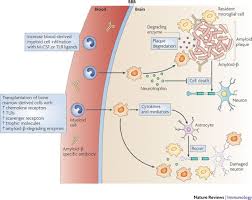Guardian Peptides: The Brain's Role in Immune Regulation

A new study from Washington University School of Medicine in St. Louis has unveiled how the brain communicates with the immune system to maintain a delicate balance between defending against threats and protecting healthy tissue. This research, conducted in mice, identified immune-stimulating protein fragments called guardian peptides that are produced by the brain and spinal cord to help regulate the immune response.
Published in *Nature*, the findings suggest that these guardian peptides are crucial for preserving the brain's immune balance and enabling healthy interactions with the immune system. Jonathan Kipnis, PhD, a distinguished professor at WashU Medicine, remarked, "We have discovered guardian brain peptides that actively engage with the immune system to keep it in check, potentially preventing harmful immune responses."
The study highlights the role of a specific subset of T cells in immune surveillance, which can trigger an immune response upon detection of potential threats. These T cells rely on tiny protein fragments displayed by presenting immune cells to recognize and respond to danger. The researchers found that guardian peptides were prominently presented by immune cells at the brain's borders, effectively attracting and activating regulatory T cells that help suppress abnormal immune reactions.
Min Woo Kim, a graduate student in the Medical Scientist Training Program at WashU Medicine, investigated the immune cells in healthy mice and discovered a wealth of brain proteins presented by these cells, particularly a component of the myelin sheath. This protective covering of neurons is often damaged in conditions like multiple sclerosis (MS). The study noted a significant depletion of these proteins in mice with MS. By injecting missing brain-derived peptides into the cerebrospinal fluid of MS-affected mice, the scientists were able to activate and expand suppressor T cells, leading to improved motor function and slowed disease progression compared to control groups.
Kim stated, "We have identified a novel process in the brain where the organ actively engages with the immune system to present a healthy image of itself. In mice with multiple sclerosis, that image is markedly different. We believe other neuroinflammatory and neurodegenerative diseases might present unique protein signatures to the immune system, paving the way for their use as diagnostic tools for early detection."
Collaborators on the study include Cheryl Lichti, PhD, Clair Crewe, PhD, Maxim N. Artyomov, PhD, and the late Emil R. Unanue, a pioneer in the field of immunology. This research not only sheds light on immune regulation within the central nervous system but also holds promise for developing improved therapies for neuroinflammatory diseases like MS and Alzheimer’s disease.
Story Source:
Materials provided by Washington University School of Medicine. The original text of this story is licensed under a Creative Commons License. Note: Content may be edited for style and length.
Journal Reference:
- Min Woo Kim, Wenqing Gao, Cheryl F. Lichti, Xingxing Gu, Taitea Dykstra, Jay Cao, Igor Smirnov, Pavle Boskovic, Denis Kleverov, Andrea F. M. Salvador, Antoine Drieu, Kyungdeok Kim, Susan Blackburn, Clair Crewe, Maxim N. Artyomov, Emil R. Unanue, Jonathan Kipnis. Endogenous self-peptides guard immune privilege of the central nervous system. Nature, 2024; DOI: 10.1038/s41586-024-08279-y

0 Comments